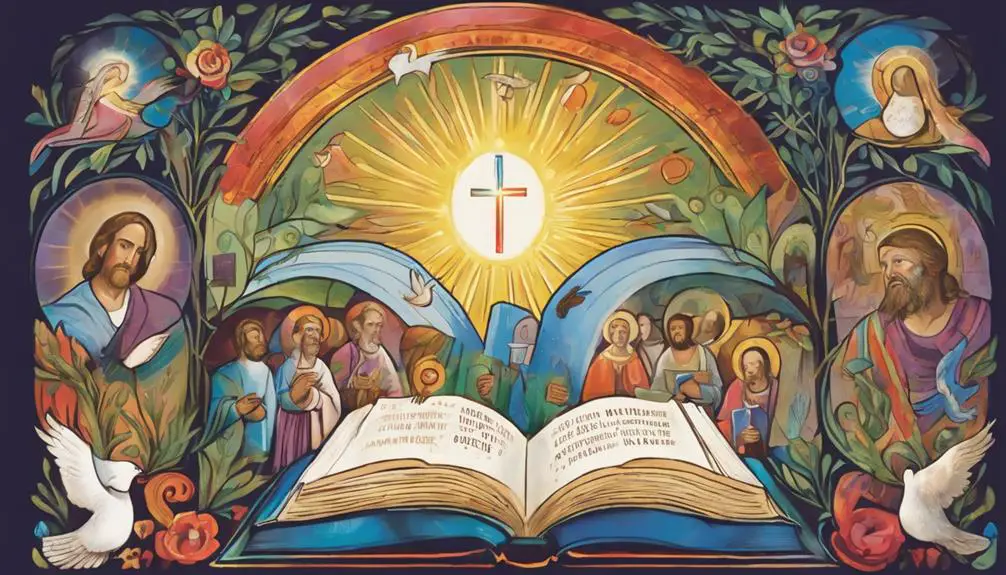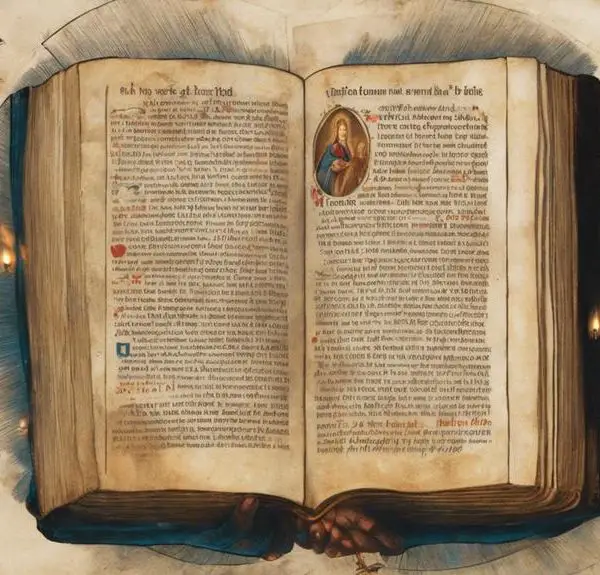Head into the depths of Joel 2, as we unravel prophetic symbolism, repentance, and divine promises in this intriguing Bible study.

Joel 2 Bible Study Questions
In Joel 2, we tiptoe into the realm of prophetic symbolism and divine promises. You're invited to examine this chapter's intricate tapestry, where the threads of prophecy, repentance, and divine assurance are woven together.
How does the concept of 'The Day of the Lord' appear and what does it signify in this context? What can we glean from Joel's passionate call to repentance?
Allowing these questions to hover in your mind, let's venture further into the depths of this Bible study, opening up a world of rich insights and profound reflections.
Key Takeaways
- Delve into the symbolism in Joel 2: locusts, clouds, fire, army, and earthquakes.
- Explore the meaning and implications of 'The Day of the Lord' in Joel 2.
- Reflect on the promises of restoration, abundance, and spiritual renewal in Joel 2.
- Understand the importance and impact of individual and collective repentance in Joel 2.
Understanding Joel 2 Context

Diving into the context of Joel 2, you'll find it provides a vivid prophetic vision that calls for a deeper, scholarly interpretation. This biblical chapter is nestled within the broader framework of the Book of Joel, an Old Testament prophetical book. The context lies in a period of intense calamity for Israel, a time of national distress and uncertainty.
The chapter starts with a terrifying description of an invading army, symbolizing God's judgment. It's a call for repentance, a plea for the people to turn their hearts back to God. The language used isn't just for dramatic effect; it's a sobering reminder of the consequences of turning away from God.
But you'll find that Joel 2 isn't all gloom and doom. In the latter part of the chapter, there's a promise of restoration and blessing. This shift is significant and it's worth noting the stark contrast between the beginning and the end of the chapter. It highlights God's dual character as a God of justice, but also as a God of mercy and grace.
Analyzing Prophetic Symbolism

In analyzing the prophetic symbolism in Joel 2, you'll uncover layers of meaning hidden within the vivid imagery of the text. It's crucial to interpret these symbols within the context of the Old Testament, as they were understood by Joel's original audience.
Consider this table:
Symbol |
Possible Interpretation |
Scripture Reference |
|---|---|---|
Locusts |
Judgement from God |
Joel 2:1-11 |
Dark clouds |
Impending disaster |
Joel 2:2 |
Fire |
God's wrath |
Joel 2:3 |
A great and powerful army |
Invading force |
Joel 2:2-9 |
The earth quakes |
God's intervention |
Joel 2:10 |
For example, locusts can be seen as a symbol for God's judgement, as they devour everything in their path, leaving devastation in their wake. Similarly, dark clouds often signify impending disaster, while fire is a common symbol for God's wrath. The 'great and powerful army' may represent an invading force, and geological disturbances like earthquakes often symbolize God's divine intervention. By understanding these symbols, you're on your way to delving deeper into the rich, prophetic messages of Joel 2.
Joel 2: The Day of the Lord

What does 'The Day of the Lord' in Joel 2 really signify for us today? It's not just a historical or future event; it's a metaphor for divine intervention, a time when God steps in to judge and correct. The term 'Day of the Lord' has been used to describe both a time of blessing and destruction, depending on context.
In Joel 2, the 'Day of the Lord' is portrayed as a time of great calamity, marked by a locust plague symbolic of an invading army. It's a day of darkness and despair, a time when God's wrath is unleashed. Yet, it's also a call to repentance. Joel implores the people to return to God with fasting, weeping, and mourning, promising that God is gracious and merciful, slow to anger and abundant in steadfast love.
For us today, 'The Day of the Lord' serves as a reminder that God's justice is inescapable. It's a call to self-examination and repentance. It's a promise that God's mercy is available to those who turn back to Him. It's a warning that the consequences of ignoring God's ways are severe.
Interpreting Divine Promises

Examining the divine promises in Joel 2, you'll find a rich tapestry of hope and redemption woven amidst warnings of judgment and destruction. The text holds a dualistic nature, containing elements of both despair and hope. This dichotomy serves to highlight the magnitude of God's forthcoming blessings.
In verses 18-27, you'll see God's promises of restoration and abundance. The Lord vows to repay for the years devoured by locusts, an allegorical representation of all forms of devastation. This promise isn't just of material prosperity but also spiritual renewal, as seen in verse 28 where God promises the outpouring of His Spirit on all people.
Yet, interpreting these promises requires nuanced understanding. It's not just about literal rewards but also spiritual blessings. The material prosperity symbolizes the abundant life that God desires for His people, while the pouring out of the Spirit signifies a deep, transformative relationship with God that's accessible to all.
Reflecting on Joel's Call to Repentance

Turning your attention to Joel's call for repentance, you'll find it's not merely a plea, but a profound invitation towards transformation and redemption. His call isn't just an admonition; rather, it's an opportunity for change, a chance to reorient your life towards God's will.
To further discuss, the table below presents a detailed analysis:
Verse |
Message |
Implication |
|---|---|---|
Joel 2:12 |
"Yet even now," declares the LORD, "Return to Me with all your heart" |
It's never too late to repent and align with God's will. |
Joel 2:13 |
And rend your heart and not your garments. |
"True repentance is inward, impacting the heart, not just outward actions. |
Joel 2:14 |
Who knows whether the LORD will not turn and relent and leave a blessing behind Him? |
There's always hope in God's mercy and forgiveness. |
Joel 2:15 |
Blow a trumpet in Zion, Consecrate a fast, proclaim a solemn assembly, |
Collective repentance can create a ripple effect, leading to societal transformation. |
Viewing Joel's call to repentance in this light, you'll appreciate its depth and breadth. It's not just about personal transformation; it's ushering in a societal change. This is a call to examine not just your actions, but your heart as well.
Conclusion
In examining Joel 2, you've delved into its historical context, unraveled its prophetic symbolism, and confronted the profound concept of the Day of the Lord.
You've interpreted divine promises and reflected on Joel's urgent call to repentance.
By maintaining an analytical, detailed, and scholarly approach, you've deepened your understanding of this complex biblical chapter, enriching your spiritual journey and highlighting the critical role of personal repentance in divine redemption.



Sign up